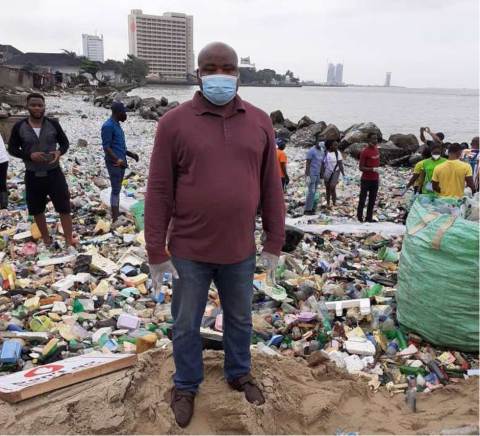Research Study on COVID-19 Impacts on Chemicals and Wastes in Nigeria

Under the situation of movement restrictions due to the COVID-19 pandemic in Nigeria, there was the likelihood of increased generation of solid waste as a result of increased consumption, with increased accumulation due to working from homes and surges in household waste due to increased online shopping. New kinds of wastes, such as used face masks and hand gloves, empty hand sanitizer containers and other plastic materials, have also been introduced into the environment, and such wastes have become somewhat ubiquitous, with fly-tipping (illegal dumping) and improper disposal.
The changing solid waste generation dynamics and the need for continued waste collection and recycling, improved risk communication to citizens and stakeholders, and protection from the hazards faced by waste pickers, represent some of the critical, COVID-19-related waste management areas requiring attention (UN-Habitat, 2020). This would seem to have implications for justice and sustainability in the solid waste sector in Nigeria, thus posing a significant dilemma to environmental and health policymakers in Nigeria.
For this project, Pan African Vision for the Environment (PAVE) completed a desktop review, undertook one-on-one interviews with key respondents (such as The Lagos Waste Management Authority and Abuja Environmental Protection Board) and conducted field observation visits to poor communities in the states and areas that were studied. The Lagos Waste Management Authority in Lagos and Abuja Environmental Protection Board in Abuja, which are the epicenters of the COVID-19 pandemic response in Nigeria, were also visited. Respondents were selected to achieve balance in gender, socio-economic status and other locational characteristics.
At the conclusion of the project, PAVE agreed that, although a raft of policies have been developed and adopted in Nigeria regarding the COVID-19 emergency response, there is a lack of guidance on how to adapt regular municipal waste management services to a pandemic situation (UN-Habitat 2020). More importantly, a notable gap in Nigeria’s existing solid waste management (SWM) efforts is the absence of an inclusive SWM policy. The study argues that SWM under the COVID-19 pandemic qualifies as an emergency service and ought to have been treated as an essential service in Nigeria.
This report relates to Sustainable Development Goals 3, 6, 8, 10, 11 and 12.
Special thanks to IPEN's Anglophone Africa Regional Coordinator Silvani Mng'anya and IPEN's Anglophone Africa Regional Hub AGENDA for their important contributions to the development and finalization of the project.
| Attachment | Size |
|---|---|
| 293.16 KB |
